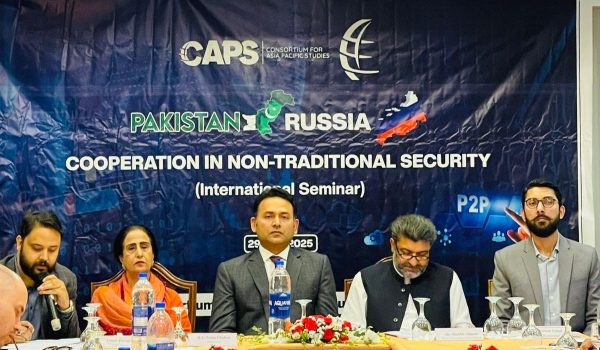Pakistan-Russia Cooperation in Non-Traditional Security

Executive Summary
Historic transformation in the global order has presented Pakistan an opportunity to explore new avenues of cooperation beyond the traditional strategic realm. Driven by these structural changes, Pakistan’s engagement with Russia has increased manifolds. However, much of the focus remains on high-politics, where Islamabad face a difficult equation between Moscow and New Delhi. Against this backdrop, we intended to explore new avenues of cooperation in non-traditional security areas such as regional connectivity, labor migration, education, and cultural diplomacy. The event featured insightful presentations from prominent speakers, including Russian and Pakistani scholars. The forum emphasized the necessity of proactive engagement, institutional collaboration, and sustainable people-to-people linkages between Pakistan and Russia.
Session Highlights
– The session was chaired by Dr. Khurram Iqbal, President of CAPS, who reaffirmed the consortium’s mission to promote Pakistan’s linkages across the Asia-Pacific and Eurasian regions. He noted that Russia remains a critical player in regional geopolitics and encouraged greater collaboration in areas that have traditionally been overlooked in bilateral relations.
– Dr. Roksolana Zigon, a renowned Russian expert on geopolitics, delivered a thought-provoking address on the urgent need to tackle non-traditional security threats, particularly water scarcity. Criticizing the unilateral suspension of the Indus Water Treaty by India, she deemed the move unacceptable and condemned the exaggerated narratives promoted by Indian media. Dr. Zigon noted a strategic divergence in regional approaches, observing that India often resorts to non-diplomatic aggression, whereas Pakistan has exhibited a more measured, diplomatic, and strategic response to shared challenges. In this context, she proposed that Pakistan should pursue a new framework for cooperation with Russia, grounded in mutual respect, shared interests, and long-term strategic thinking. This recalibrated partnership, she emphasized, must rest on two critical pillars: technological sovereignty, educational collaboration
– Mr. Taimur Fahad, Associate Researcher at the Institute of Strategic Studies in Islamabad, comprehensively analysed the North-South Corridor and its pivotal role in strengthening connectivity between Pakistan and Russia. Despite ongoing geopolitical shifts and external pressures, Mr. Fahad highlighted how the barter trade mechanism has proven to be a practical and effective solution for sustaining uninterrupted commercial exchange. He also outlined a range of policy measures to overcome the prevailing barriers, such as customs inefficiencies, bureaucratic red tape, sanctions, and geopolitical rivalries. These included the integration of railway networks, streamlining customs regulations, developing secure and efficient financial exchange systems, and establishing green channels for perishable goods.
– Dr. Ilsur, a faculty member in the Department of International Relations at Kazan University, delivered a compelling analysis of the cultural linkages between Pakistan and Russia, highlighting these connections remain significantly underexplored. Dr. Ilsur categorized these linkages into three main spheres: political, economic, and cultural, asserting that the heart of this relationship lies in sustained cultural and economic exchanges. While acknowledging that cultural influence requires time to mature, he stressed its long-term, transformative impact. In particular, he proposed that cultural festivals and events could serve as meaningful venues for fostering mutual understanding and deeper engagement. Dr. Ilsur argued that cultural cooperation, when combined with economic collaboration, forms the essential foundation of a sustainable and enduring partnership between Pakistan and Russia—one that transcends conventional political or economic frameworks.
– Dr. Shabbir Ahmed, Director of the CARS Area Study Centre at the University of Peshawar, presented a detailed analysis of the evolving prospects for labor exports in light of Russia’s changing immigration policies. Since February 2025, Russia has introduced two new laws to facilitate labor migration, including a temporary residence program for three years and a five-year Russian green card to address growing demands. However, Dr. Ahmed noted that Russia still faces a labour deficit of around 4.8 million workers, particularly in the manufacturing, construction, and transportation sectors. He stressed the potential for sending more skilled labor to Russia, given the higher salaries and increasing demand for specialized workers.
– Mr. Gleb Makarevich, Senior Research Fellow at the Primakov Center for World Economy and International Affairs, Russian Academy of Sciences, thoughtfully assessed the current state of academic collaborations between Russia and Pakistan. He identified significant challenges that hinder the full potential of academic linkages, particularly bureaucratic barriers and a general lack of awareness on both sides. Despite expressing optimism about the progress made in fostering academic partnerships. Additionally, he highlighted the limited expertise on both sides, especially regarding understanding each other’s languages, which poses an additional barrier to meaningful academic exchanges.
Recommendations
1.Establish institutional dialogues between Pakistan and Russia to prioritize bilateral relations and address structural and geopolitical barriers, particularly in trade.
2.Promote PPPs to support sustainable infrastructure development and enhance commercial connectivity, especially through the International North-South Transport Corridor (INSTC).
3.Organize Russian cultural festivals in Islamabad through CAPS to strengthen people-to-people connections between Pakistan and Russia.
4.Develop Russian language skills of “Russia experts in Pakistan”. This could be done through taking NUML on board and simultaneously introducing Russian language at major universities offering degrees in International Relations.
5.To meet Russia’s growing demand for skilled workers, focus on skill development programs, particularly in IT, engineering, and healthcare. Additionally, strengthen bilateral agreements to facilitate smoother labor migration processes, including support for Pakistani workers navigating Russia’s immigration laws.
6.Reject unilateral regional policies such as the suspension of the Indus Water Treaty. Russian speakers also proposed to benefit from Russian technology in effective water management.
7.Inclusion of Russian professors in Pakistani universities’ panel of experts to evaluate PhD thesis instead of sending them to Western universities.
Concluding Remarks
The seminar concluded with an engaging Q&A session, where participants emphasized the urgent need to address visa barriers, bureaucratic hurdles, and limited public engagement as key obstacles to realizing the full potential of the Pakistan-Russia partnership. A recurring theme was the call for more proactive Russian involvement in mediating Pakistan-India conflicts, particularly concerning critical issues like the Indus Waters Treaty (IWT). Participants urged Russia to adopt a constructive diplomatic role, leveraging its historical ties and regional influence to promote dialogue and de-escalation in South Asia.
No. 07/2025 dated April 29 2025


